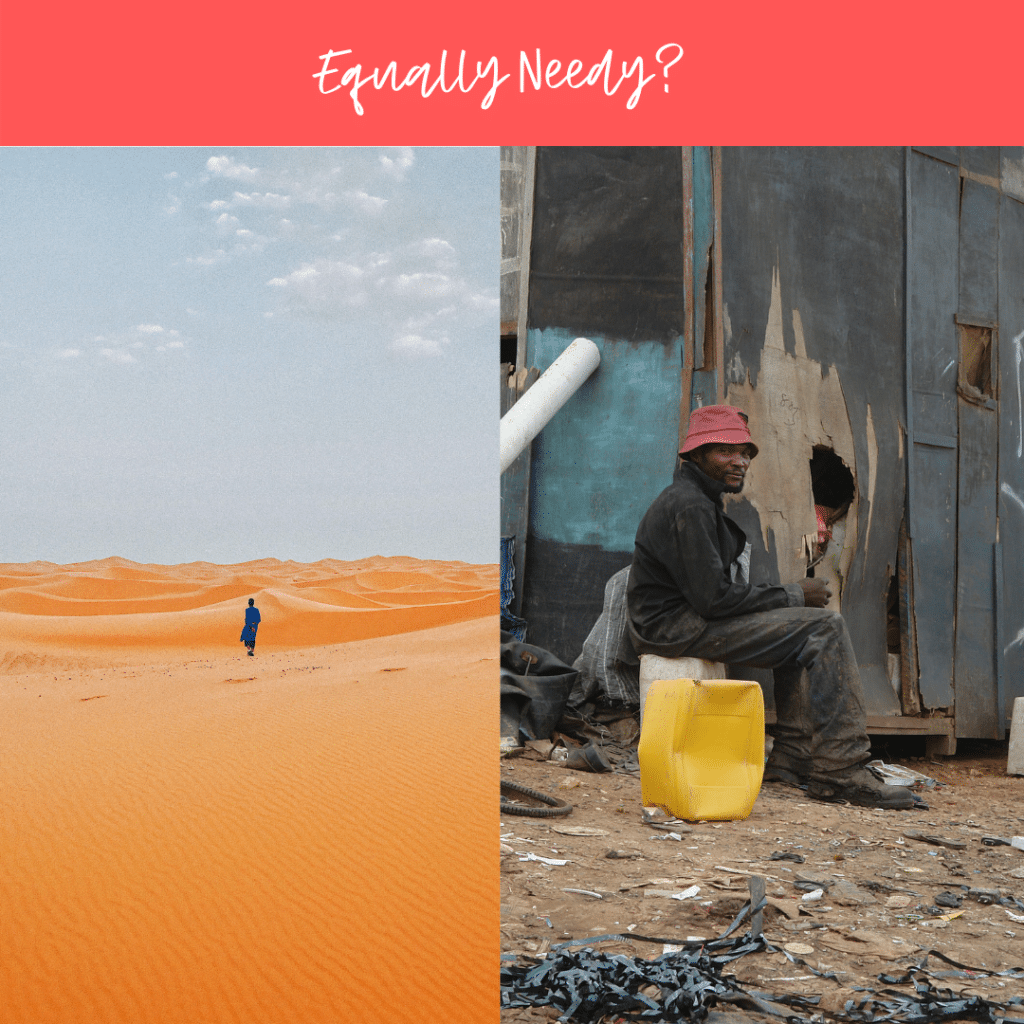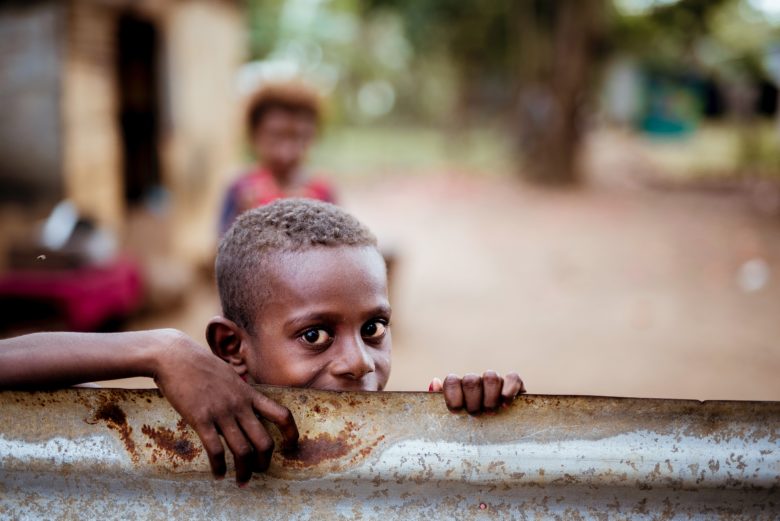“All men are equally lost, but not all men are equally needy.” Do you agree? Dr. Ralph Winter, a missionary pioneer, and one of the founders of the modern frontier missions movement made this claim. The assertion that unreached peoples must receive greater focus sparked debate. It also brought a new emphasis for many agencies. YWAM was touched by Winter’s trumpet call to the unreached. YWAM Frontier Missions is part of the result.
Are DMMs Reaching the Least Reached?
Yet still today, many decades later, much of our focus in evangelism remains on those who already have an opportunity to hear. Should they choose to. As Disciple Making Movements continue to grow around the world, we must continue to champion the cause of the unreached. DMMs that start, must be missional in nature. They need to have a clear focus not only on the lost, but on the least reached lost around them.
Two Hungry Men
Let us go back to Winter’s statement. Are all people the same as far as their spiritual needs? To understand this, let’s return to the metaphor.
Say there are two hungry people who haven’t eaten for a while. Let’s say it’s been 3 days. Their stomachs growl, asking to be fed. They are in need.

Now imagine one of them is in the middle of the Sahara desert, wandering around with no one nearby to help. There is no grocery store to buy food even if they had money to do. Hundreds of miles to the north, south, east, and west is only sand. They do not know the way out of the desert and have sat down to die.
The other person is in a Ghanaian slum. They walk past markets and food stalls. If someone were to give them a dollar, they could immediately buy bread. They have relatives who have food whose homes are just a kilometer away.
Are these two hungry people equal in their need? Are they the same or different? Who is easier to help? Who needs help more?
For the Son of Man came to seek and to save the lost.
Luke 19:10 NIV.
God’s love is the same for both those people. Absolutely. There is no question about that. And both those people must be helped to have food. They should not be left to starve. Again, no question there.
But the chance that someone will help the guy in Accra is much greater. The person in the desert may die without anyone even knowing about their need. Unless someone goes to them, and brings food or brings them to the food, they have no chance of survival.
The Bread of Life Is Far, Far Away For Some
The idea of reaching the unreached is exactly this. Some people groups, and some religious blocks, have no access to the gospel.
They don’t know Christians personally, nor do they have Bibles in their own languages. Though they may have heard of Christianity, they’ve never had the good news of Jesus explained to them in their own language. Nor in a way they could understand.
They need someone to make an intentional effort to reach across the barriers. There are cultural gaps that prevent them from receiving the gospel message (the deserts). And they will die having never understood about God’s love unless someone goes to them across those gaps.
The Unreached
Did you know that one-third of the population of our world, is like the man in the desert? Spiritually speaking? The bread of life is very, very far away from them. It may not be geographically unavailable – there are churches nearby perhaps. But culturally and linguistically, it’s very far away. Are you catching my meaning here?
The Need For New Movement Streams
Let me give another more tangible example.
In Far Western Nepal, there is a city called Nepalgunj. There are Hindus, Buddhists, Muslims, and Christians there. The majority are Hindu. There are some churches, and almost 1% of the population are Jesus followers. Those who are Christians, are from Hindu backgrounds.
In that area, there are also many Muslims. When you walk through the city you encounter women wearing the hijab or burka. The official population of Muslims is around 2.5%.
Christian efforts to reach their neighbors in Nepalgunj are naturally among Hindus. To reach the Muslims there, it will take a different approach due to language and cultural barriers.
The Hindu, Buddhist, and Muslim of that area are all unreached.
I would venture to say though, that the Muslims are “more unreached” than the Hindus. Why?
Because there are many more people who are culturally and linguistically “near” to them who could share the good news with them if they would. They are like the man in Nairobi.
The Muslims, however, are more like the man in the desert. It will take a clear, intentional, cross-cultural effort to go and share the good news with them. It must be done in a different, culturally appropriate way, or they will die having never heard the good news.
Movements In Reached Areas Need to Pioneer New Streams
Disciple Making Movements are taking off around the world. Praise God! Many are happening among unreached people groups, or what we now call Frontier Peoples.
There has also been a growing interest in DMMs in areas we would classify as “reached” or “evangelized.” Perhaps this is due to the lack of disciple making and discipleship in many mainline churches. In reached areas (like the United States, Australia, Canada, and Europe), there is growing interest in movements as well. They are beginning to happen in Western and Christianized nations like Kenya, Ghana, Nigeria, Uganda, too.
In the midst of DMM growth, we must continue to remember the least-reached people. Movements in Christian or reached nations need to look around them and identify the unreached peoples in their area. They must pray for them, engage with them, and help launch parallel movements among them.
Why parallel movements? Dramatic cultural barriers, make it hard for those from these religious backgrounds to integrate well. They don’t fit into existing movements. To take the Nepal example, those from a Muslim background would find it difficult to worship with someone from a Hindu background. Their culture and language are radically different.
What Must We Do?
The movements we begin need to intentionally focus on the unreached. From the very beginning of disciple making instill a heart for Frontier Peoples.
We can’t skip over the part of the Great Commission where Jesus said to make disciples of all nations. Not only your own people group, but all nations was His command. Be sure to teach that part as you train disciple makers!
Every movement can dream about starting new movement streams among other people groups in unreached areas. This will require apostolic teams to go, reaching cross-culturally. They will need to be sent, supported, and released from the movement.
Put It In Your End Vision Statement
Is this part of your End Vision? Which unreached peoples live near you?
YWAM Frontier Missions has a special program going on this week for young people. It’s called the #Every Challenge. It’s a week-long event to inspire and educate youth, age 16-25, about the needs of the unreached.
Every person on the planet needs to hear about Jesus’ love – that’s why it’s the #Every challenge. If your church or movement has young people in it, encourage them to take part. Find out more or sign up at ywamfm.org/every.
Let’s start DMMs that reach the unreached! Amen?
Share your comments below or join our community on the DMMs Frontier Missions Facebook group.



